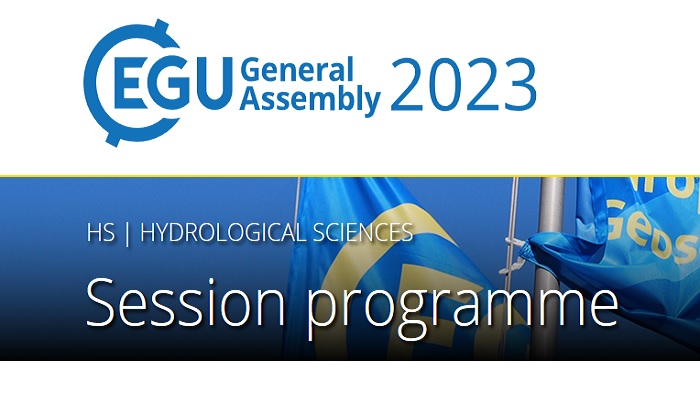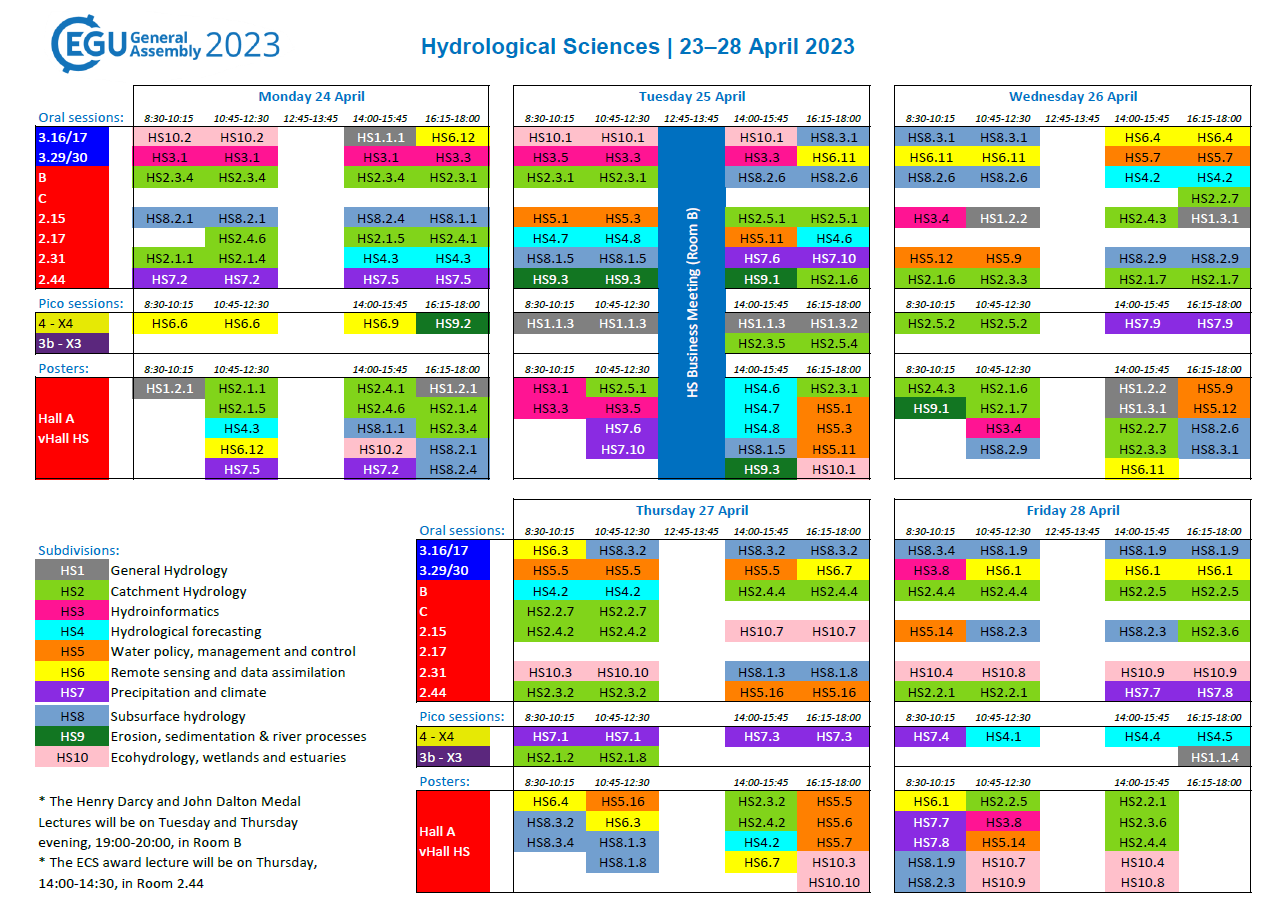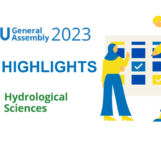
EGU General Assembly 2023 is coming soon, 23–28 April 2023, with more than 16,000 presentations (orals, posters, and PICOs) that will be delivered and viewed both onsite in Vienna (Austria Center Vienna) and virtually (through Gather.Town).
Great news this year:
- The poster sessions are back, and all formats (orals, posters and PICOs) will have a hybrid component, offering, in different ways, means to participants to interact either onsite or virtually.
- Also back this year is the networking time, from 18:00 to 19:00, where we can come together (onsite or online) to chat, network or just see a little bit more of those posters we liked. Many networking events have been planned, so keep an eye on the updates in the conference website pages and twitter accounts (here for EGU and here for the Hydrological Sciences (HS) division).
- Finally, the EGU Booth will host special events as we are taking the opportunity to celebrate the 20 years of EGU and more! To prepare yourself, read the highlights of the HS Division in the past years here.
For the Hydrological Sciences division, about 2,900 presentations are included in the programme, of which 2,467 presentations are in 96 scientific sessions (including 18 PICOs) that are led by the division. The 2023 conference programme is online, as you know, but how do we navigate through this broad choice of things to see?
How to start
Whether you are planning to attend onsite or online, you need to take a couple of hours to prepare your own schedule for the week. It is time well spent, since it will help you later to get the most out of the meeting.
Building your personal programme (here) is a good way to bring together sessions of your interest. Tips can be found here.
If this is your first time at an EGU General Assembly and, in particular, if you are an Early Career Scientist (ECS), then you should not miss the “Pre-EGU Online Networking Event”, which will take place on 19 April 2023, co-organized with the Young Hydrologic Society (check here for more info and how to register).
The events below might be of interest too (more tips here):
- SC1.1 – How to navigate the EGU: tips and tricks, Mon, 24 Apr, 8:30–10:15 (CEST), pre-recorded
- SC1.2 – How to get involved with EGU, Mon, 24 Apr, 10:45–12:30 (CEST), pre-recorded
- NET7 – First-time attendee Networking, Tue, 25 Apr, 12:45–13:45 (CEST), Room 3.29/30
- HS ECS Networking Event, Mon, 24 Apr, 12:30–13:30 CEST, EGU networking zone – suite C (Red level)
What is in the HS Division programme for 2023?
Our advice is to start your daily planning for EGU23 with the Hydrological Sciences programme, and then move on checking sessions organized by the other EGU divisions to add more to your initial programme.
Something not to miss (a meeting point for EGU hydrologists) is our division meeting, where we present what we did in the past year; we say thank you for those officers who are ending their terms; we introduce the new officers; we vote on the composition of the division’s committees, etc. This year is a special meeting as one president is leaving and another is just stepping in!
The HS Division Meeting will be on Tue, 25 Apr, 12:45–13:45 (CEST) (Room B in Vienna & online).
Other meetings for the sub-programme groups of the HS Division can be found under PGM (everybody interested is invited to join):
- HS2 – Catchmet hydrology, Thu, 27 Apr, 12:30–14:00 (CEST), Room 2.32
- HS3 – Hydroinformatics, Wed, 26 Apr, 14:00–16:00 (CEST), Room 2.32
- HS4 – Hydrological Forecasting, Wed, 26 Apr, 12:30–13:45 (CEST), Room 2.32
- HS5 – Water policy, management and control, contact the chair of this topic if you are interested to join the community (here)
- HS6 – Remote sensing and data assimilation, Wed, 26 Apr, 12:45–13:45 (CEST), Room 2.33
- HS7 – Precipitation and climate, Wed, 26 Apr, 18:00–19:00 (CEST), Room 2.32
- HS8 – Subsurface hydrology, meeting will take place as a dinner on Wednesday evening (8 pm), contact the chairs of this topic if you are interested (here)
- HS9 – Erosion, sedimentation & river processes, Wed, 26 Apr, 10:30–11:30 (CEST), Room 2.32
- HS10 – Ecohydrology, wetlands and estuaries: aquatic and terrestrial processes and interlinkages, Thu, 27 Apr, 12:45–13:45 (CEST), Room 2.33
For the scientific sessions, we have prepared the HS Schedule at a glance (click on the link in the caption to get the PDF version).

CLICK HERE TO GET THE FULL PDF FILE
We have a group of sessions related to Hydrological Sciences for Policy and Society:
- HS1.1.1 – The Science-policy interface in hydrology (invited presentations and panel discussion), Mon, 24 Apr, 14:00–15:45 (CEST), Room 3.16/17
- HS1.1.3 – Panta Rhei: Hydrology, Society & Environmental Change | PICO, Tue, 25 Apr, 08:30–12:30 (CEST), 14:00–15:45 (CEST), PICO spot 4
- HS1.1.4 – Elevating practice in the science-policy-practice nexus: highlights from operationalization of hydrological research and interdisciplinary collaborations | PICO, Fri, 28 Apr, 16:15–18:00 (CEST), PICO spot 3b
In Education and Outreach, our (personal) selection of sessions is:
EOS2.4 – Education and teaching in hydrology: changing values and practices for a new era, Posters onsite and virtual, Attendance Wed, 26 Apr, 14:00–15:45 (CEST), Hall X2 (onsite) and vHall EOS (online in Gather.Town)
And:
- EOS1.1 – Science and Society: Science Communication Practice, Research, and Reflection
- EOS1.2 – Exploring the Art-Science Interface
- EOS1.3 – Games for Geoscience
- EOS2.1 – Open session in Teaching & Learning in Higher Education
- EOS2.7 – Research Management: Challenges and Solutions for Successful Research Projects and Programmes
- EOS3.1 – Promoting and supporting equality, diversity and inclusion in the geosciences
- EOS5.1 – GIFT 2023: Geoscience Information For Teachers
Some additional sessions for your daily planning
Monday 24 April
- US2 – How can institutions assess impact beyond citations? Paths towards recognition and impact, 08:30–12:30 (CEST) Room E1
- GDB2 – As climate change impacts accelerate, are we sleepwalking into the inferno…?, 16:15–18:00 (CEST) Room E1
- GDB5 – Is social media outreach?, 14:00–15:45 (CEST) Room E1
- SC4.9 – Theory and tools of statistical forecast verification, 08:30–10:15 (CEST) Room -2.85/86
- SC4.2 – Geodesy 101, 16:15–18:00 (CEST) Room -2.85/86
Tuesday 25 April
- DM7 – Division meeting for Hydrological Sciences (HS), 12:45–13:45 (CEST) Room B
- MAL15 – Henry Darcy Medal Lecture by Marc F. P. Bierkens, 19:00–20:00 (CEST) Room B
- US4 – Juggling parenting and caring responsibilities with a career in the geosciences: barriers and opportunities to increasing accessibility and inclusion, 14:00–18:00 (CEST) Room E1
- US5 – Allyship and supporting others for a more diverse and inclusive, 08:30–10:15 (CEST) Room E1
- GDB3 – The Science activist: should science get Political?, 10:45–12:30 (CEST) Room E1
Wednesday 26 April
- US1 – Managing compounding impacts from extreme events through societal crises, 10:45–12:30 (CEST) Room E1
- EOS2.4 – Education and teaching in hydrology: changing values and practices for a new era, 14:00–15:45 (CEST), Hall X2/vHall EOS
- SC4.10 – Hydroinformatics for hydrology: Introduction to large-scale hydrological modelling, 08:30–10:15 (CEST) Room -2.61/62
- SC3.13 -What are Science4Policy competences and why are they crucial for researchers to achieve policy impact, 16:15–18:00 (CEST) Room -2.61/62
Thursday 27 April
- MAL17 – John Dalton Medal Lecture by Taikan Oki, 19:00–20:00 (CEST) Room B
- MAL41 – HS Division Outstanding ECS Award Lecture by Inge de Graaf, 14:00–14:30 (CEST) Room 2.44
- GDB4 – Scientific Neocolonialism: tools and mechanisms to advocate and amplify the voices, knowledge and recognition of local knowledge in geoscience research, 10:45–12:30 (CEST) Room E1
- GDB6 – Open access publishing: national strategies, challenges and solutions, 08:30–10:15 (CEST) Room E1
- SC3.9 – DataViz: Visualise your data effectively and avoid common pitfalls, 16:15–18:00 (CEST) Room -2.61/62
- SC4.8 – Dealing with complex systems: tipping points, causal relations, and multi-scale dynamics, 16:15–18:00 (CEST) Room 0.15
Friday 28 April
- US3 – Challenges and solutions to increasing accessibility, representation, recognition and diversity of European countries in the European geosciences community, 08:30–12:30 (CEST) Room E1
- SC4.6 – Introduction to Information Theory, 08:30–10:15 (CEST) Room -2.85/86
After all, if you are still looking for more science, check the “Workshop on the IAHS Science for Water Solutions Decade”, organized by the International Association of Hydrological Sciences at TU Wien on Saturday 29 April; more details can be found here.
Final reminders
With so many interesting presentations and events, you will have a hard time to move from one session to another (in particular if you are attending onsite and the sessions are held in different floors), so our advice: find one session you want to attend per time block (TB) and stick to it, eventually moving from one room to another during coffee/lunch breaks.
Some difficult choices will have to be made, but you will probably enjoy more the meeting if you participate in the full discussions of a session (and you can always use the coffee breaks and networking time – from 18:00 to 19:00 – to exchange with other colleagues on what happened there where you were not!).
For presenters: don’t forget that this year you have to upload your presentation the latest 24 hours before your session starts! Check the “Guidelines for Presenters” for more information.
Finally, keep an eye on the EGU23 website for updates, and follow us on Twitter.
We are looking forward to seeing you all in Vienna or online!
Maria-Helena Ramos, HS Division President (2019-2023) and EGU Programme Committee Co-chair (2023)
Alberto Viglione, HS Division President (2023-2025) and HS Division Programme Chair (2023)


